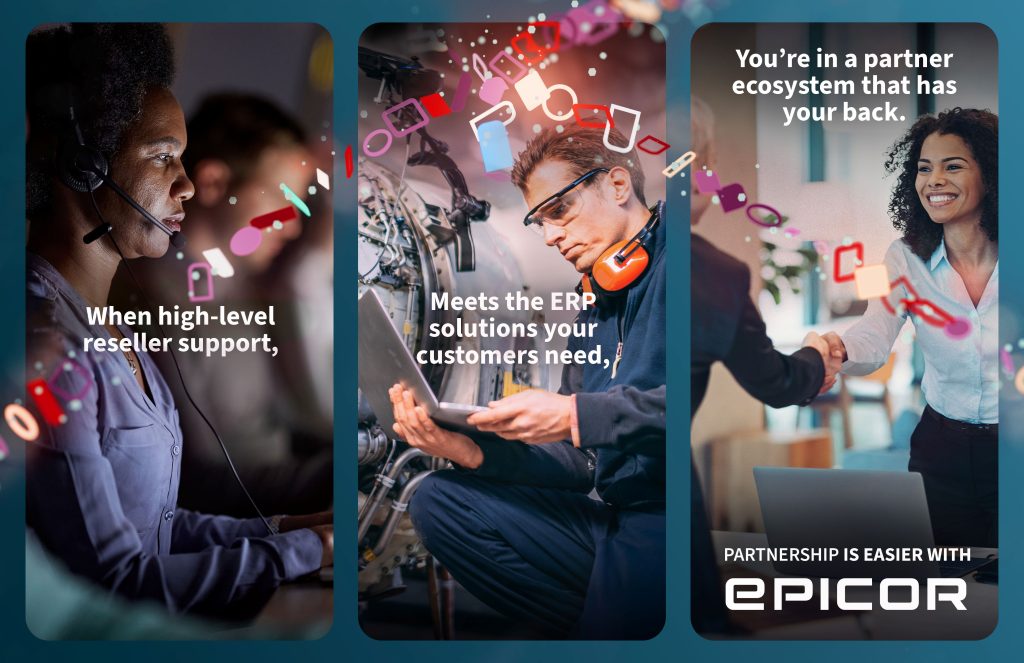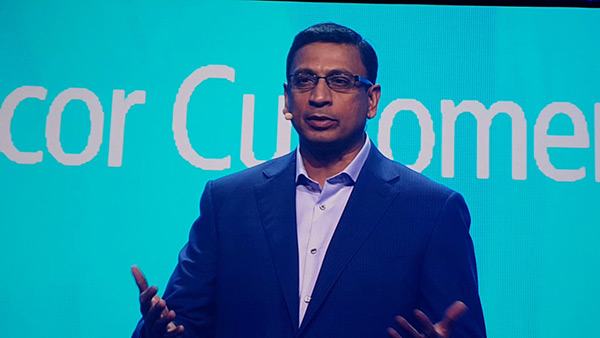In today’s fast-evolving ERP landscape, technology alone is no longer enough. True transformation is driven by the strength of ecosystems—those networks of partners, customers, and vendors who align not just on solutions but on vision. At the heart of Epicor’s channel success is Brenda Nobleza, Vice President of Americas Channel, whose 17-year career in the partner space has been marked by a relentless focus on value creation, trust, and vertical specialization.
In this exclusive ERPNews interview, Brenda shares how Epicor is redefining what it means to be a channel-centric organization. From vertical enablement and deal protection to practical enablement and cross-functional alignment, she provides a compelling roadmap for building sustainable, high-impact partnerships in the ERP space.

- With over 17 years of experience in the channel space, what key shifts have you observed in how partners engage and drive growth?
Over my career, I’ve witnessed several fundamental shifts in the channel ecosystem. The most significant has been the evolution from transactional relationships to strategic partnerships focused on joint value creation. Partners today are no longer just resellers – they’re specialized consultants bringing deep industry expertise and customized solutions to clients.
Another major shift has been the transition from on-premise to cloud-based solutions, which has completely transformed business models. Partners now focus on lifetime customer value rather than one-time implementations, emphasizing recurring revenue streams and continuous customer success.
More recently, I’ve seen partners increasingly specialize in specific verticals and build their own IP on top of platforms like ours. This specialization allows them to differentiate in crowded markets and deliver extraordinary value to customers with unique requirements.
Finally, the expectation for speed of deployment and ROI has dramatically increased. Customers want immediate business impact, which has driven partners to develop pre-built solutions, accelerators, and proven implementation methodologies.
- Epicor emphasizes that “Easier doesn’t cut corners. Easier opens doors.” Can you elaborate on how Epicor’s partner ecosystem embodies this philosophy in practice?
At Epicor, “Easier doesn’t cut corners. Easier opens doors” isn’t just a tagline – it’s our guiding principle for partner enablement. We’ve intentionally designed our partner program to remove unnecessary complexity, streamline processes, and provide clear pathways to success.
This philosophy manifests in how we onboard new partners with structured training paths and role-based certifications that give their teams practical skills without overwhelming them. Our Partner Portal provides a single destination for all resources, eliminating the need to navigate multiple systems.
We’ve also simplified our deal registration process to ensure partners can protect their opportunities efficiently. Our technical enablement focuses on real-world applications rather than theoretical concepts, giving partners practical tools they can immediately use with customers.
Most importantly, we make business planning and collaboration straightforward. Our channel managers work closely with partners to develop actionable growth strategies without excessive paperwork or administrative burdens. This approach opens doors by allowing partners to focus on what matters most – delivering value to customers and growing their businesses.
- What are the critical elements that make Epicor’s channel program stand out from other vendor-partner models in the ERP space?
Epicor’s channel program distinguishes itself through several key differentiators. First, we take a highly personalized approach to partner relationships. Unlike vendors who manage partners primarily through portals or automated systems, we invest in understanding each partner’s unique business model and growth objectives.
Second, our industry focus creates natural alignment with specialized partners. We’ve built our solutions for specific verticals like manufacturing, distribution, and retail, which helps partners develop deep expertise rather than spreading themselves too thin across disparate markets.
Third, we offer genuine territory protection and deal registration that partners can trust. We’ve created clear rules of engagement that respect partner investments in developing opportunities. Simply put, we do not compete with our partners.
Our enablement model is also distinctive. Rather than overwhelming partners with every product feature, we focus training on the capabilities most relevant to their target markets, helping them become productive more quickly.
Finally, we’ve structured our program to reward loyalty and performance while providing attractive margins that support sustainable partner businesses. We believe in creating long-term partnerships rather than constantly recruiting new partners to replace churned relationships.
- Epicor offers role-based onboarding, certifications, and ongoing support for partners. How have these structured investments translated into real-world partner success stories?
Our structured enablement approach has directly contributed to partner success across multiple dimensions. For example, one of our manufacturing partners leveraged our role-based technical certifications to develop expertise in our cloud platform, successfully transitioning from primarily implementing on-premise solutions to confidently deploying our cloud ERP for mid-market manufacturers. This transformation expanded their market opportunity and positioned them for sustainable growth.
Another success story involves a partner who utilized our sales enablement framework to build a specialized practice for wood products manufacturers. By combining our industry-specific training with their domain knowledge, they’ve established themselves as a trusted implementation partner in that niche, significantly growing their Epicor practice.
We’ve also invested in best-in-class sales enablement tools that have transformed how partners engage with prospects. These advanced platforms have helped partners decrease their sales cycles and in some cases, close deals without requiring traditional product demonstrations – allowing them to focus on business value rather than feature demonstrations.
And our support for partner marketing has also yielded impressive results. Through our marketing concierge service, partners receive guidance in creating targeted campaigns. One distribution-focused partner used these resources to launch a series of industry-specific webinars that generated a substantial increase in qualified opportunities for their business.
These examples illustrate how our structured investments in partner enablement translate into tangible business outcomes – helping partners specialize, differentiate, and ultimately grow their Epicor practices more effectively than they could with less focused programs.
- What role does Epicor’s financial structure play in incentivizing and retaining high- performing partners?
Epicor’s financial structure is strategically designed to reward partner commitment and performance while supporting sustainable business growth. We start with competitive margins that recognize the value partners bring to the table. Unlike vendors who constantly squeeze partner profitability, we’ve maintained attractive economics that support partners’ ability to invest in their Epicor practices.
We’ve also implemented a tiered structure that rewards increased commitment with enhanced benefits. As partners achieve higher tiers through certification, customer satisfaction, and revenue growth, they unlock additional financial incentives like improved margins, rebate opportunities, and marketing development funds.
Importantly, our program balances new customer acquisition with customer lifetime value. We provide incentives not just for new logo acquisition but also for expanding existing accounts and ensuring high renewal rates. This approach helps partners build predictable, recurring revenue streams rather than chasing one-time implementations.
We also incentivize partners’ investments in their own growth through co-funded marketing initiatives and specialized solution development. When partners invest in building their Epicor practice, we match their commitment with additional resources.
This balanced approach to financial incentives has been instrumental in both attracting new partners and retaining our highest performers, many of whom have partnered with us for well over a decade.
- You’ve been instrumental in expanding Epicor’s channel verticals. What strategies have proven most effective in scaling both reach and revenue across diverse markets?
Drawing on my 17+ years of channel experience, I’ve found that building highly effective, scalable programs requires a foundation of strategic focus rather than opportunistic expansion. At Epicor, the most effective strategy has been targeted partner recruitment focused on firms with existing vertical expertise rather than attempting to create that specialized knowledge from scratch. We look for partners who already understand the unique challenges in industries like metal fabrication, lumber, automotive aftermarket, or retail and then equip them with Epicor’s purpose-built solutions.
We have fostered a dynamic and collaborative ecosystem where partners unite to deliver innovative solutions and exceptional services to our shared customers. Instead of competing, they strategically pool their expertise and resources, leveraging collective strengths to drive greater value and success for all stakeholders. This synergy allows us to enhance efficiency, accelerate innovation, and create a seamless experience that benefits both partners and customers alike.
We’ve also found success through enabling cross-vertical expansion for existing partners with complementary capabilities. For instance, helping manufacturing partners extend into distribution, or retail partners add service management components to their offerings.
Another powerful approach has been creating verticalized enablement resources – industry-specific demo environments, ROI calculators, and implementation accelerators – that help partners confidently enter new markets with proven tools rather than starting from scratch.
Finally, we’ve developed specialized marketing programs for key verticals, helping partners effectively position their Epicor offerings to specific industries through targeted messaging, content, and campaigns that resonate with each market’s unique challenges and objectives.
- How does Epicor ensure alignment between its internal teams and external partners to deliver a unified experience to customers?
Alignment between Epicor’s internal teams and our partner ecosystem begins with organizational structure. We’ve integrated our channel organization across all functional areas – sales, marketing, product, and services – rather than treating partners as a separate silo. This ensures partner considerations are incorporated into all strategic decisions.
Clear rules of engagement provide transparency about how we manage opportunities, preventing channel conflict before it starts. These guidelines are documented, consistently communicated, and form the foundation of our operating model.
We’ve implemented unified systems that give partners and Epicor teams visibility into the same customer information, ensuring everyone works from a single source of truth. Our Partner Portal integrates with our internal systems to provide seamless access to resources and customer data.
Our internal incentive structures also reinforce collaboration. Epicor sales executives receive credit for partner-led deals in their territories, encouraging them to support partners rather than compete with them.
Perhaps most importantly, we foster a culture of partnership throughout the organization. From our executive leadership to frontline support representatives, we consistently reinforce that partners are an extension of Epicor and essential to our customers’ success.
Through these aligned systems, processes, and cultural elements, we deliver a unified experience where customers benefit from the combined strengths of Epicor and our partners.
- Channel relationships often depend on trust and collaboration. How do you nurture long-term partnerships and maintain strong partner engagement over time?
Building lasting partner relationships starts with consistency and transparency. Partners need to know what to expect from us, whether that’s in program policies, financial terms, or communication cadence. We maintain consistent leadership in our channel organization and avoid frequent program changes that can erode trust.
Regular executive engagement demonstrates our commitment at the highest levels. Our executive team conducts quarterly business reviews with strategic partners, ensuring alignment on priorities and providing visibility into our roadmap and strategic direction.
We’ve also established formal feedback mechanisms through our Partner Advisory Council and QBR’s. More importantly, we act on that feedback by implementing meaningful changes based on partner input.
Recognition plays a crucial role in nurturing engagement. Our partner awards program celebrates exceptional achievements, while our partner community events create opportunities for partners to share successes and build relationships not just with Epicor, but with each other.
Perhaps most fundamental is our commitment to shared success. We measure our channel team on partner satisfaction and growth metrics, ensuring our organization is incentivized to help partners achieve their business objectives. When partners succeed, we succeed – and this alignment forms the foundation of enduring relationships.
- As technology evolves, what innovations or trends do you believe will most impact the channel ecosystem in the next few years?
AI and machine learning will fundamentally transform the channel ecosystem in several ways. For partners, these technologies will enable more predictive and personalized customer engagements while automating routine implementation tasks. This shift will allow partners to focus more on high-value consultative services rather than technical configuration.
We’re also seeing increasing demand for comprehensive solutions that extend beyond traditional ERP boundaries. Partners who can integrate ERP with IoT, advanced analytics, and industry-specific applications will have a significant advantage. This creates opportunities for partners to develop their own IP and specialized offerings built on core platforms.
The acceleration of vertical cloud solutions will continue, with partners needing deeper industry specialization rather than broad technical skills. This trend favors partners who can combine technology implementation with genuine business process expertise in specific sectors.
Security and compliance requirements are becoming more complex and will require partners to develop specialized practices addressing these concerns. Those who can effectively navigate regulatory requirements like GDPR, CCPA, and industry-specific regulations will be highly valued.
Finally, we’re seeing the emergence of new partnership models beyond traditional reselling and implementation. Ecosystem partnerships where multiple specialized providers collaborate to deliver comprehensive solutions will become increasingly important. Partners who can orchestrate these ecosystems will create significant value for customers and capture new revenue streams.
- For potential partners considering joining the Epicor ecosystem, what message would you like to share with them about the opportunity ahead?
If you’re considering joining the Epicor ecosystem, you’re looking at a unique opportunity to align with a company that truly values partners as integral to our collective success. We offer something increasingly rare in the enterprise software space – a genuine commitment to partner-led growth coupled with solutions purpose-built for specific industries where many of you already have deep expertise.
What sets Epicor apart is our focus on making business “easier” for both our partners and customers. We’ve eliminated unnecessary complexity from our partner program, providing clear paths to profitability without bureaucratic hurdles. Our industry-focused approach means you can leverage your existing vertical expertise rather than starting from scratch with horizontal technologies.
The market opportunity is substantial. Mid-market enterprises in manufacturing, distribution, retail, and services are actively seeking modern cloud solutions from trusted advisors who understand their unique challenges. With Epicor, you gain access to proven technology specifically designed for these industries, backed by enablement resources that accelerate your time to market.
Most importantly, when you join Epicor, you become part of a community that genuinely collaborates rather than just coexists. Our partners regularly tell us that the level of engagement they experience with Epicor – from executive accessibility to responsive support – distinguishes us from other vendors they work with.
If you value true partnership, industry focus, and the opportunity to build a differentiated practice with strong margins, we would welcome a conversation about how Epicor can help you achieve your business objectives.
Closing Note:
As channel models continue to evolve, Epicor’s approach—rooted in clarity, trust, and industry focus—serves as a powerful case study in long-term partner success. Under Brenda Nobleza’s leadership, the company is proving that in the modern ERP landscape, it’s not just about software. It’s about building ecosystems that scale, sustain, and succeed—together.




